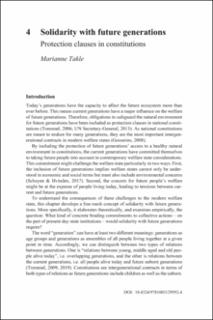Solidarity with Future Generations? Protection clauses in constitutions
Chapter, Peer reviewed
Published version
Permanent lenke
https://hdl.handle.net/11250/2827347Utgivelsesdato
2021-09-13Metadata
Vis full innførselSamlinger
Originalversjon
https://doi.org/10.4324/9781003129592Sammendrag
By including the protection of future generations’ access to a healthy natural environment in constitutions, the current generations have committed themselves to taking future people into account in contemporary policy considerations. This commitment might challenge welfare states’ sustainability and lead to tensions between current and future generations. To understand the consequences of these challenges, this chapter develops a fine-mesh concept of solidarity with future generations. More specifically, it elaborates theoretically, and examines empirically, the question: What kind of concrete binding commitments to collective actions – on the part of present-day state institutions – would solidarity with future generations require? Four dimensions of solidarity are developed from how solidarity has been used historically in European thinking: the foundation, objective, boundaries, and collective orientation of solidarity. The chapter analyses how each dimension separately differs from solidarity with contemporaries. The empirical relevance of this theoretical concept is evaluated by applying it to Norway as an example of a country that has included a protection clause for future generations in its constitution. Moreover, a climate lawsuit from 2016 through to the final judgement from the Supreme Court in 2020, reveals that the protection clause in the Norwegian Constitution has only weak binding commitments to collective actions on the part of present-day state institutions. It is, however, important to note that this lawsuit involves much more than just the case itself. It not only creates public discussions, but it also shows the ideas that form the basis for the actors’ arguments about how to create a political system that is designed to safeguard the welfare of current and future generations.

